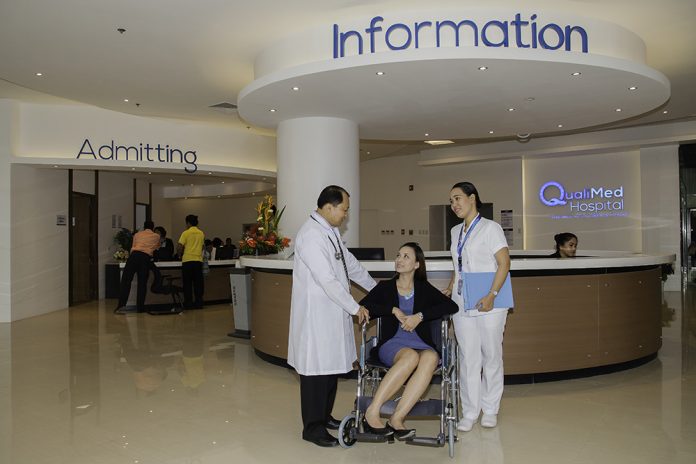
ILOILO City – The Philippine Health Insurance Corporation (PhilHealth) Regional Office 6 is expecting a rise in the number of claim cases it will be entertaining this 2019 as President Rodrigo Duterte enacted the landmark Universal Health Care (UHC) law on Feb. 20.
The UHC program aims to extend free PhilHealth coverage to all Filipinos.
In 2018, PhilHealth-6 handled a total of 786,045 cases – with 28 percent and 17 percent coming from the indigent and informal sector, respectively – granting a total of P7,743,931,340 in paid claims, the social health insurer’s regional data shows.
With the UHC in effect, Acting Regional Vice President Janet Monteverde told Panay News they expect an estimated 10 percent increase in the number of cases in Western Visayas this year. Rounding up, Monteverde projected that PhilHealth-6 could serve around 900,000 cases this 2019 – a significant rise when compared to 2018 year-on-year.
With PhilHealth-6 pegging the average value per claim at P10,000, Monteverde expressed that it could translate to around P9 billion in approved claims this landmark 2019 under the UHC – an increase of around P1.3 billion from the previous year.
Acting regional vice president declared that she is confident a “robust” PhilHealth is ready to better serve the Filipino people this year, especially with the added appropriations for the insurer’s fund as mandated by the Universal Health Care law.
The Department of Health (DOH) earlier said the government will need about P257 billion in the first year it implements the universal health care law.
“Estimates show that in the first year of implementation, around P257 billion will be needed to introduce the reforms. Taking into account existing budget, the funding gap is estimated to be around P164 billion. Additional revenues from the proposed increase in tobacco taxes are seen as important means to lessen and address precisely the funding gaps,” said Health secretary Francisco Duque.
Under the law, contributors-or income earners-will have to pay slightly higher premiums while the government will shoulder the contributions of non-contributors.
PhilHealth Acting president and CEO Dr. Roy B. Ferrer has assured that Congress has set aside P235 billion for the law. These came from Philippine Charity Sweepstakes Office, income from the Philippine Gaming Corporation, and member contributions – as well as a portion of the sin taxes and TRAIN (Tax Reform for Acceleration and Inclusion) taxes on sugary drinks, paid to the government.
‘FOR ALL’
PhilHealth is reveling its 24th anniversary this 2019 with a year-round celebration themed “PhilHealth @ 24: Tungo sa Kalusugan Para sa Lahat.”
“Our strong performance last year clearly displayed our capability to run the National Health Insurance Program (NHIP). In fact, our record-setting performance in 2018 is a perfect prelude to our transition to UHC,” said Ferrer, adding that, “We have categorically proved our ability to keep the [NHIP] fund robust, dynamic, and responsive to the medical needs of the Filipinos.”
Ferrer referred to the social health insurer’s successful financial turnaround last year that was highlighted by a staggering P11.6-B in net income, or 4400 percent higher compared to 2017 end.
Its premium income was recorded at P132.5B which is 23 percent higher than that of 2017, stemming from enhanced collection measures. It also received a P6.8-B boost from investments and other income that further solidified its financial position.
On the other side of its balance sheet, PhilHealth paid a total amount of P121-B in health care benefits, translating to payouts of an average of P3 billion a week starting the second half of 2018, proof that more than ever, more and more members and their families are utilizing their benefits for their hospitalization and treatment needs.
In terms of benefit enhancements, PhilHealth has extended the provision of Primary Care Benefits to the Formal Sector, Lifetime members, and Senior Citizens. In addition, PhilHealth launched its new Z Benefit packages for children with disabilities, and increased its coverage for Newborn Care. The enhancements in benefits clearly manifested its dedication to innovation and in keeping its relevance to its beneficiaries.
However, the PhilHealth Chief stressed that to continue ensuring their robust financial position; it is incumbent that they intensify their efforts at controlling fraudulent and abusive practices of a few accredited health care providers and even members.
“In response to the issues raised by Senate President Vicente Sotto III, we are in collaboration with the National Bureau of Investigation to investigate the fraudulent acts of a health care professional and at least three hospitals in the South. In fact, the Philippine Medical Association (PMA) and the Philippine Hospital Association (PHA) have also joined us in our crackdown on fraud,” Ferrer declared. The alliance was formed during the PhilHealth Forward event held as part of its anniversary celebration last Feb. 14.
“This show of support could be a start of an effective anti-fraud cooperation that puts dishonest parties to justice. I am thankful of their [PMA and PHA] support and I hope that this continues in the future,” said Ferrer and warned that, “We will continue pursuing cases against entities committing fraud. We will not let their deceitful practices undermine the welfare of NHIP beneficiaries.”
To date, PhilHealth has filed a total of 298 cases against 71 hospitals, resulting in the suspension of accreditation of some 31 hospitals.
Finally, NHIP coverage jumped to 98 percent of the Philippine population translating to a total of 104.5 million out of the 2018 projected population of 106.4 million. PhilHealth reckoned the bill’s passage to be the deciding factor to finally cover the entire nation under the NHIP. “Once decisive push,” said Ferrer. “That’s all we need and that’s what this law will provide.”
Upon its enactment, the UHC mandates the inclusion of all Filipinos in the NHIP, and that no Filipino will be denied access to health care whenever they need them. PhilHealth even urged its members and stakeholders to involve themselves in discussions and activities that ultimately help UHC achieve its purpose./PN



